Menopause can feel like a storm of change—hot flashes, weight gain, mood swings, and sleepless nights. Most women want to know how to lose weight and build muscle during menopause, and aren’t even sure if it’s possible!
For women over 40, these symptoms often make fitness seem daunting, but here’s the truth: exercise is one of the most powerful tools to manage menopause symptoms and thrive during this transition. At Hitch Fit, we’ve helped countless women navigate menopause with confidence through our Strong & Fit Over 40 program. In this article, we’ll explore how fitness can alleviate menopause symptoms, share inspiring transformation stories, and provide research-backed tips to empower you. Ready to take control of your body and mind? Let’s dive in!
Understanding Menopause: The Challenges Women Face
Menopause, typically occurring between ages 45 and 55, marks the end of menstrual cycles and brings significant hormonal shifts. Declining estrogen and progesterone levels can trigger symptoms like hot flashes, night sweats, weight gain (especially abdominal fat), muscle loss, fatigue, and mood disturbances. According to a 2020 study in Menopause, up to 80% of women experience hot flashes, and 60% report weight gain during this phase (Karvonen-Gutierrez & Kim, 2020). These changes can erode confidence and make weight loss or fitness goals feel out of reach.
But menopause doesn’t have to define you. Exercise, particularly strength training and cardiovascular activity, can counteract these symptoms, boost energy, and restore vitality. Let’s look at how fitness transforms lives, with real stories from women who’ve done it.
Inspiring Transformations: Women Over 40 Thriving Through Menopause
At Hitch Fit, we’ve seen women over 40 and 50 conquer menopause challenges with fitness.
Take Kathy, 52, who achieved a stunning bikini body transformation. Struggling with menopause-related weight gain and low energy, Kathy joined our Strong & Fit Over 40 program. Through strength training and tailored nutrition with Hitch Fit, she lost over 40 pounds, sculpted lean muscle, and regained bikini confidence that she hadn’t felt for years!
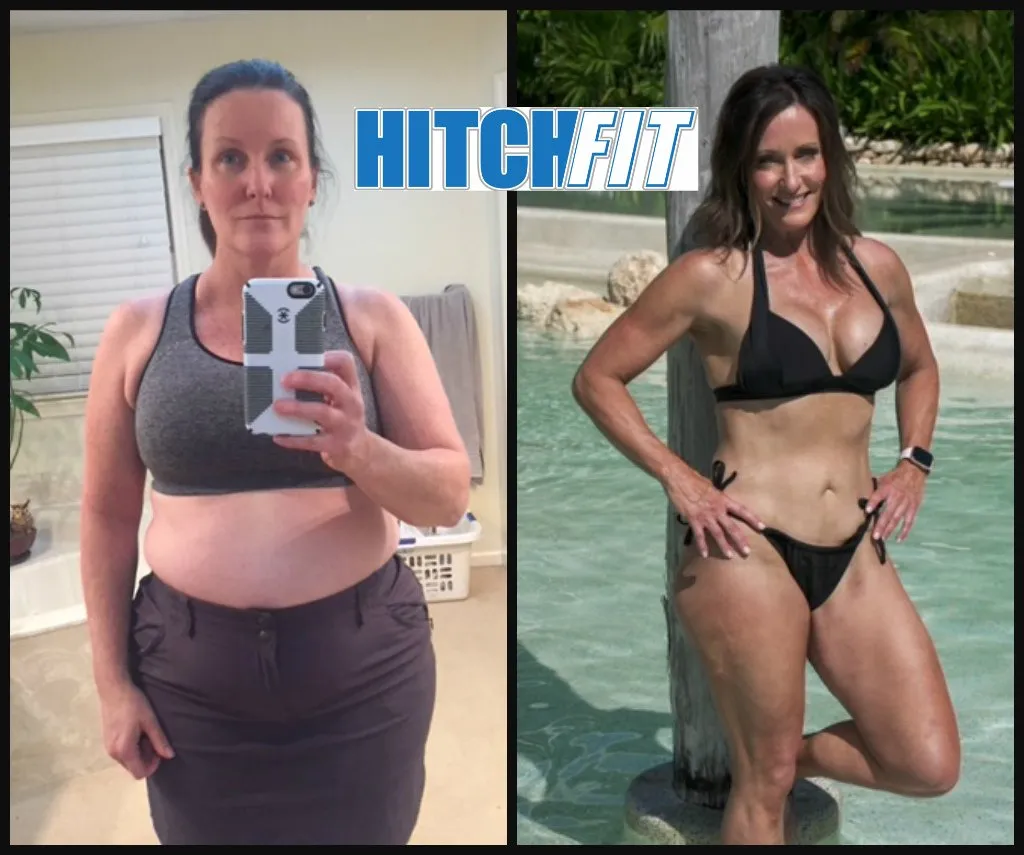
Lori, 55, faced similar hurdles with menopause-driven weight gain and fatigue. With our program’s focus on resistance training and balanced nutrition, she shed the 10 pounds she couldn’t seem to shake before, regained energy, and transformed her health, inspiring others that midlife is a time to shine.
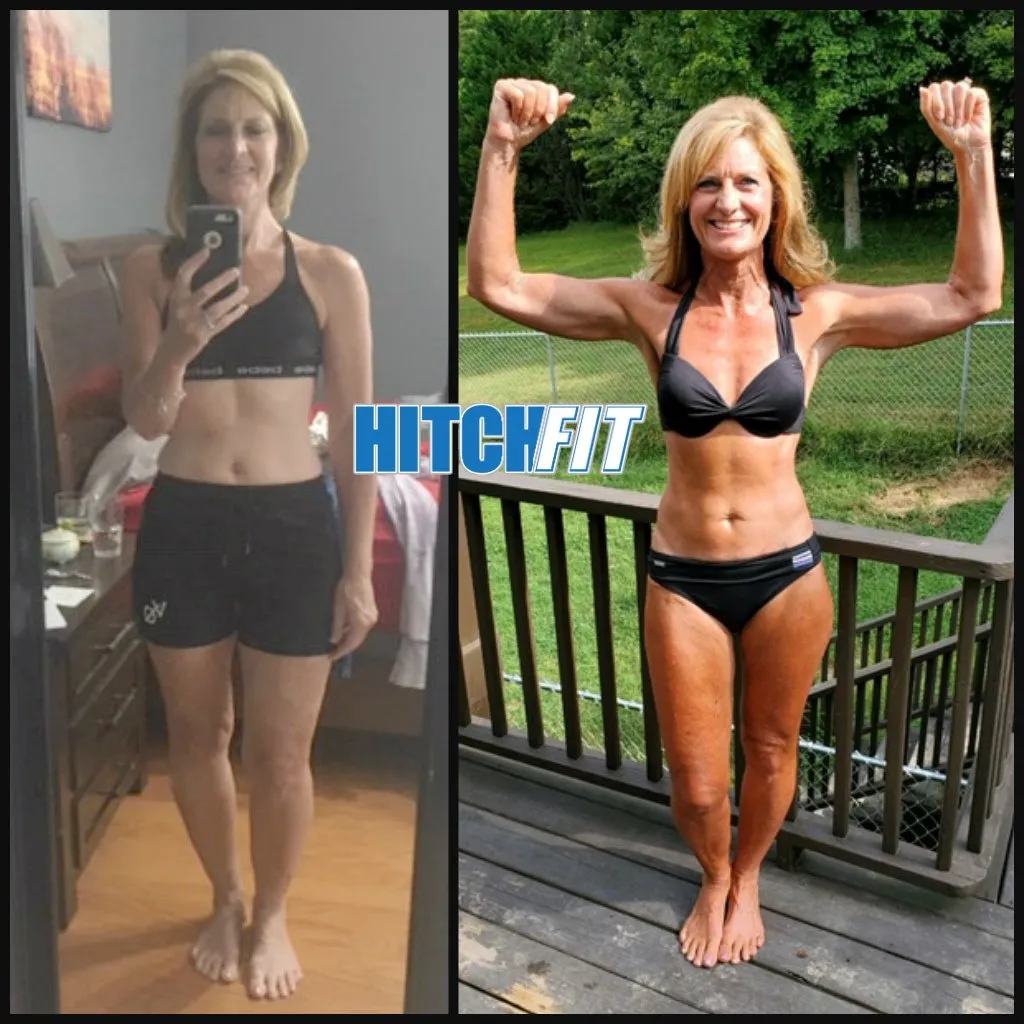
Renee, 46, battled stubborn weight and hormonal imbalances during perimenopause. Through consistent workouts and personalized coaching, she lost 12 pounds, gained strength, and felt empowered to take on life’s challenges. She was so grateful to get relief from the perimenopausal symptoms that were plaguing her, Hitch Fit changed the game for her!
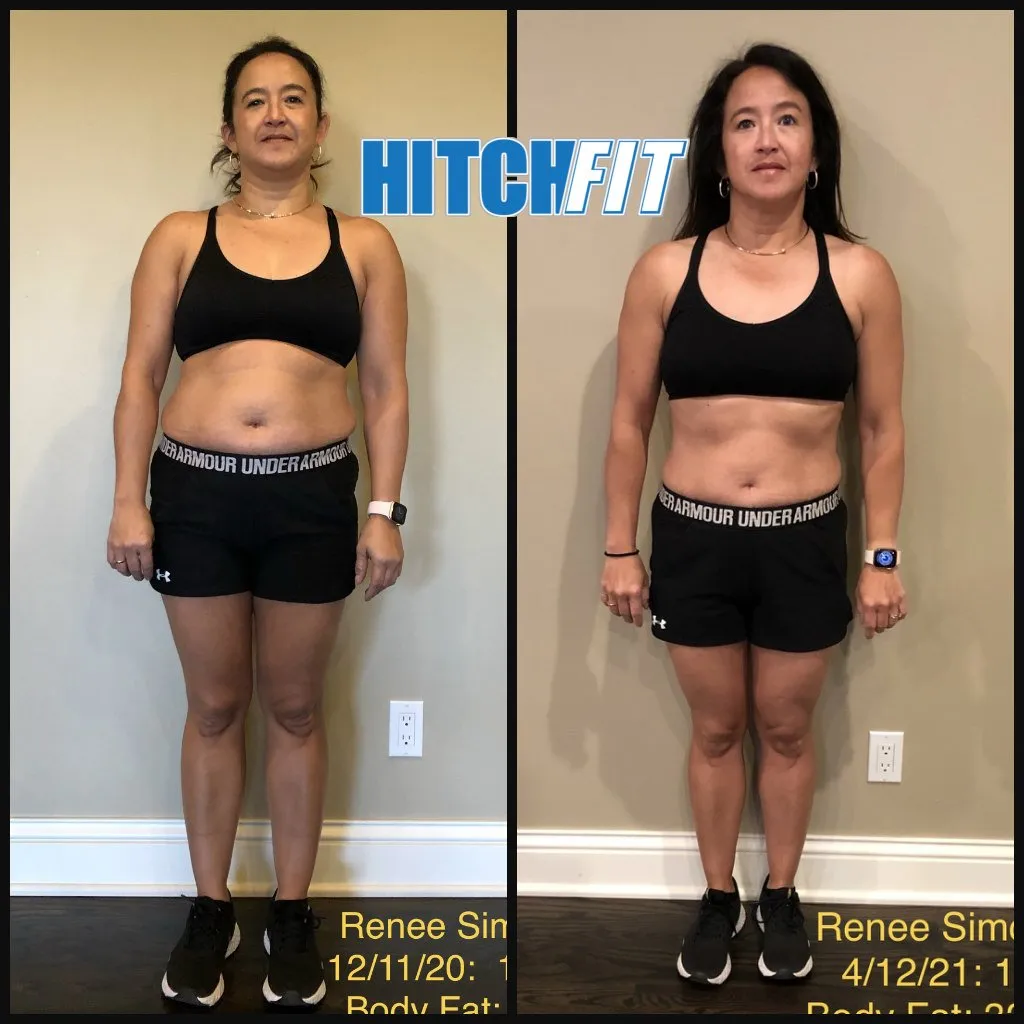
Ann, 53, battled so many challenges with her health and body (including rheumatoid arthritis), but when she started making the Hitch Fit shifts in her life, everything started to change and improve. She was hopeless at one point, but that all started to shift when she started to see her body change. After a jaw-dropping 75 pound weight loss, her life completely changed for the better!
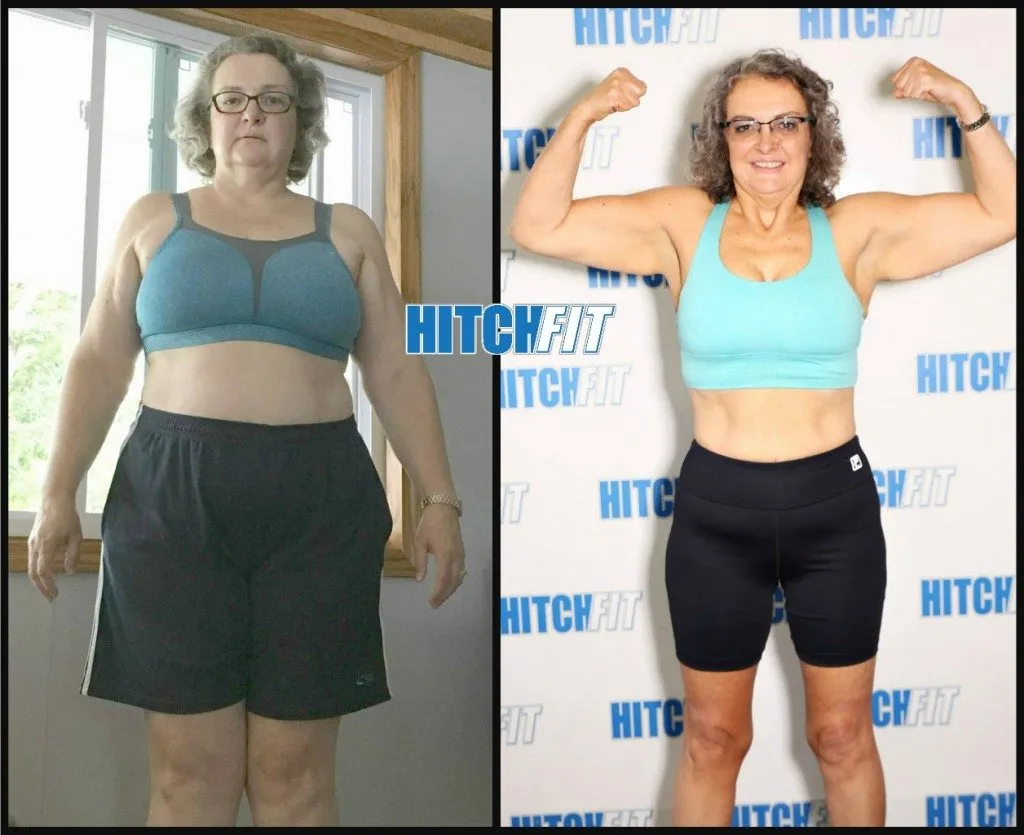
How Exercise Helps Menopause Symptoms: The Science
Exercise isn’t just about looking good—it’s a game-changer for managing menopause symptoms. Here’s what the research says:
1. Reduces Hot Flashes and Night Sweats
A 2019 study in Maturitas found that women who engaged in regular aerobic exercise (e.g., brisk walking or cycling) 3-4 times per week reported a 30% reduction in hot flash frequency and severity (Daley et al., 2019). Strength training also helps by improving thermoregulation and reducing stress hormones.
2. Combats Weight Gain and Boosts Metabolism
Menopause often leads to visceral fat accumulation due to estrogen decline. A 2021 study in The Journal of Clinical Endocrinology & Metabolism showed that resistance training 2-3 times weekly increased muscle mass and resting metabolic rate in postmenopausal women, helping them lose fat and maintain a healthy weight (Greendale et al., 2021). Cardio, like HIIT, further enhances fat burning.
3. Preserves Muscle and Bone Health
Estrogen loss accelerates muscle and bone density decline, increasing osteoporosis risk. A 2020 study in Bone found that strength training significantly improved bone mineral density and muscle strength in women over 50 (Watson et al., 2020). Exercises like squats, lunges, and deadlifts are key to staying strong and resilient.
4. Improves Mood and Sleep
Menopause can bring anxiety, depression, and sleep disturbances. A 2018 meta-analysis in Climacteric showed that exercise, particularly yoga and moderate-intensity cardio, reduced depressive symptoms and improved sleep quality in menopausal women (Cramer et al., 2018). Physical activity boosts endorphins and regulates cortisol, promoting emotional balance.
5. Enhances Energy and Confidence
Fatigue is a common menopause complaint, but exercise fights it. A 2022 study in Menopause found that women who exercised regularly reported higher energy levels and better quality of life (Sternfeld et al., 2022). Feeling stronger physically translates to mental empowerment.
5 Fitness Tips for Women in Menopause
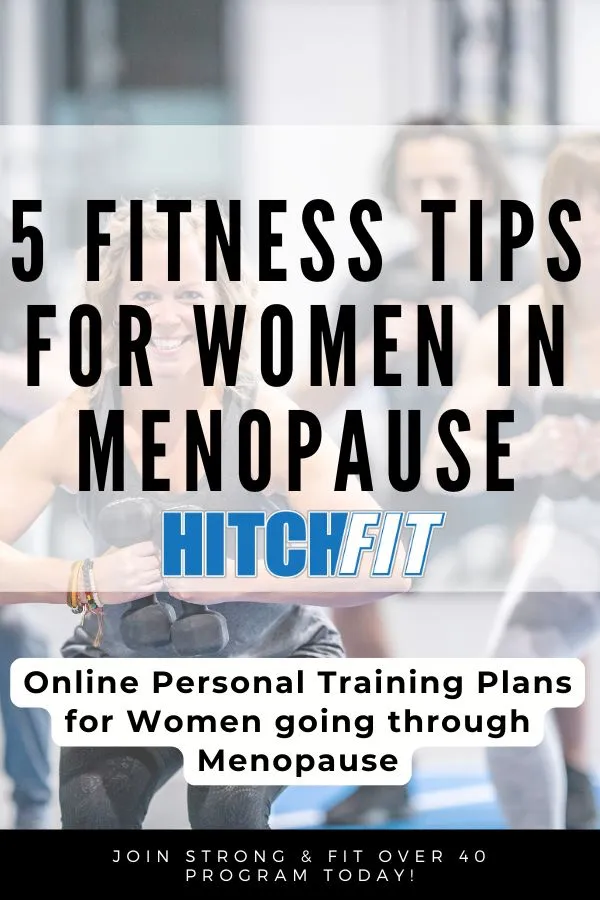
Ready to harness the power of exercise? Here are five evidence-based tips to thrive during menopause:
1. Embrace Strength Training
Aim for 2-3 strength workouts per week, focusing on compound movements like squats, push-ups, and rows. These build muscle, boost metabolism, and protect bones. Our Strong & Fit Over 40 program designs strength plans tailored to your menopausal needs.
2. Incorporate Cardio for Heart Health
Add 150 minutes of moderate cardio (e.g., brisk walking, cycling) or 75 minutes of high-intensity interval training (HIIT) weekly. This reduces hot flashes and burns fat. We include cardio routines that fit your lifestyle and goals.
3. Prioritize Protein-Rich Nutrition
Protein supports muscle maintenance and recovery. Aim for 1.6-2.2 grams per kilogram of body weight daily (Morton et al., 2018). Pair with complex carbs and healthy fats to stabilize blood sugar. Our program offers menopause-friendly meal plans to simplify nutrition.
4. Stay Consistent with a Coach
Consistency is key, and a coach ensures accountability. A 2019 study in Obesity found that coached participants were 2.5 times more likely to achieve fitness goals (Foster et al., 2019). Your Strong & Fit Over 40 coach will personalize your plan and keep you motivated.
5. Add Recovery Practices
Menopause can strain recovery, so prioritize 7-9 hours of sleep, hydration (2.7 liters of water daily), and stress-reducing practices like yoga or meditation. We guide you on recovery strategies to maximize results.
Why Strong & Fit Over 40 is Your Menopause Solution

Navigating menopause is easier with the right support. The Strong & Fit Over 40 program at Hitch Fit is designed for women like Kathy, Lori, and Renee, offering:
Personalized Workouts: Strength and cardio plans to combat menopause symptoms.
Hormone-Friendly Nutrition: Meal plans to support weight loss and energy.
Expert Coaching: One-on-one guidance to keep you on track.
Community Support: Connect with women who share your journey.
Whether you’re battling hot flashes, weight gain, or low energy, our program empowers you to feel strong, confident, and vibrant.
Take Charge of Your Menopause Journey
Menopause is not the end—it’s a new beginning. Women like Kathy, Lori, and Renee prove that fitness can transform your body and mind during this phase. Ready to feel radiant and unstoppable? Join the Strong & Fit Over 40 program at Hitch Fit and start your transformation today. Visit Hitch Fit to learn more and take the first step!
References:
Cramer, H., et al. (2018). Yoga for menopausal symptoms: A systematic review and meta-analysis. Climacteric, 21(4), 336-342.
Daley, A., et al. (2019). Exercise to reduce vasomotor and other menopausal symptoms: A review. Maturitas, 124, 24-31.
Foster, G. D., et al. (2019). Behavioral weight loss interventions: A systematic review. Obesity, 27(10), 1543-1552.
Greendale, G. A., et al. (2021). Effects of resistance training on metabolic health in postmenopausal women. The Journal of Clinical Endocrinology & Metabolism, 106(5), e2056-e2065.
Karvonen-Gutierrez, C., & Kim, C. (2020). Weight gain during menopause: A review. Menopause, 27(8), 940-947.
Morton, R. W., et al. (2018). Protein supplementation and muscle mass preservation in aging. American Journal of Clinical Nutrition, 107(2), 172-182.
Sternfeld, B., et al. (2022). Physical activity and quality of life in menopausal women. Menopause, 29(3), 301-308.
Watson, S. L., et al. (2020). High-intensity resistance and impact training improves bone mineral density in postmenopausal women. Bone, 138, 115472.
hitchfit.com (Article Sourced Website)
#lose #weight #build #muscle #menopause
